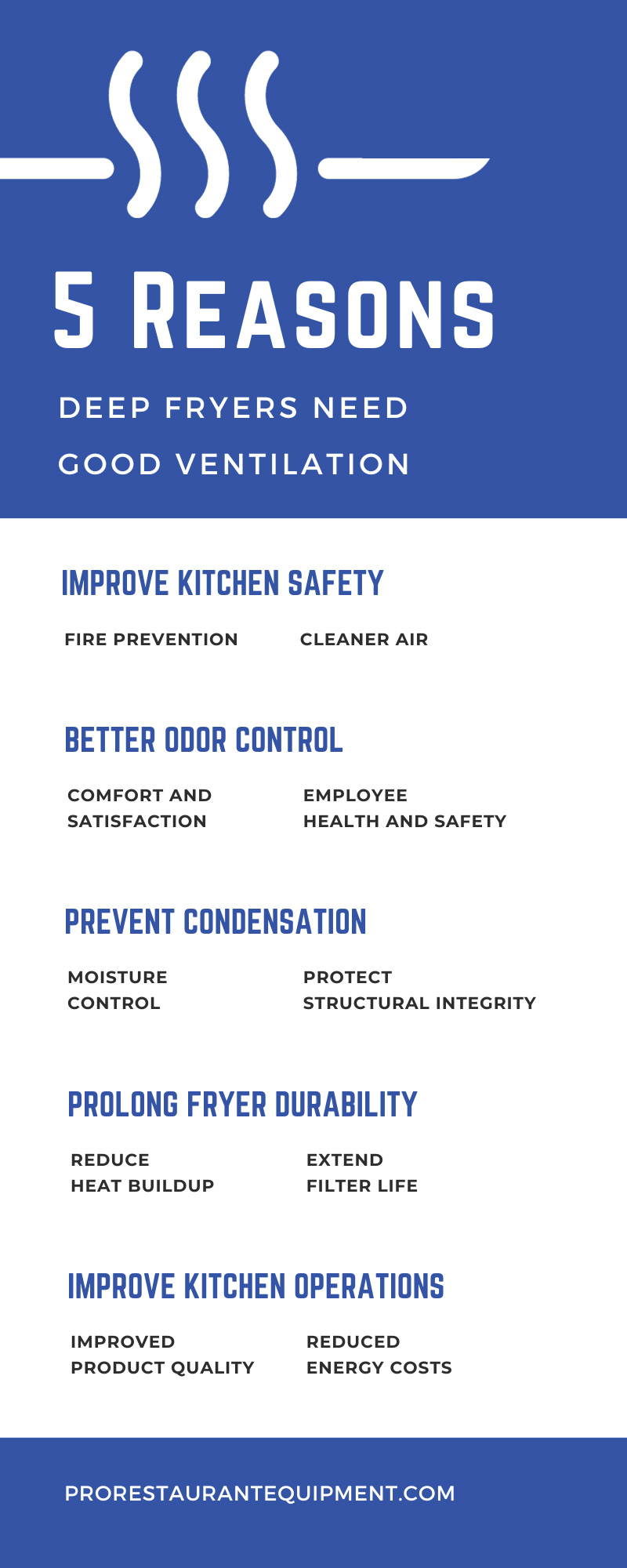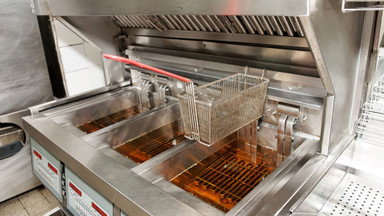Nov 8th 2023
5 Reasons Deep Fryers Need Good Ventilation
If you want to expand your restaurant’s menu, you may need to invest in more equipment. One piece of equipment you can consider is a deep fryer. Deep fryers make delicious food your patrons will love. Before investing in one, though, you’ll need to ensure your kitchen has good ventilation. There are five reasons deep fryers need good ventilation—follow along as we explain them below.
How Deep Fryers Work
Before you decide whether you want to integrate a deep fryer into your kitchen and accommodate its ventilation needs, you should understand how these appliances work. Deep fryers have several important components that help them work.
Heating Element
The first component of a deep fryer is the heating element, typically electric and integrated into the tank or positioned below it. It heats the oil to temperatures ranging from 300°F to 375°F. A thermostat maintains the heat by controlling the heating element.
Fryer Tank
The fryer tank varies in capacity, commonly ranging from 10 to 100 pounds. Rectangular tank shapes are more efficient, requiring less oil.
Filtration System
Deep fryers use a filtration system to maintain oil quality and flavor. Gravity or pump filtration options are available.
Safety Features
Safety features include high-temperature limit switches, automatic shut-off for low oil levels, and built-in fire suppression systems. Some fryers have computerized controls for precision cooking that monitor oil temperature and quality.
Improve Kitchen Safety
Now that you understand how deep fryers work, you can better appreciate how to keep your kitchen safe while using one. Good ventilation is a key part of kitchen safety, especially with a deep fryer.
Fire Prevention
Oil can easily catch fire when heated to high temperatures, especially if there is a buildup of grease or other flammable materials in the fryer. Good ventilation helps to remove these dangerous fumes from the kitchen, decreasing the risk of a fire.
Cleaner Air
Frying food releases oil and other particles into the air, which can be harmful if inhaled over long periods of time. Good ventilation around the fryer and throughout the kitchen helps to remove these particles, creating cleaner air for employees and customers.
Better Odor Control
Cleaner air isn’t just part of kitchen safety—it also helps with odor control. Strong smells from cooking and frying can leave your establishment smelling unpleasant and even trigger complaints from patrons and employees. Good ventilation around deep fryers can provide better odor control, which has additional benefits for your restaurant.
Comfort and Satisfaction
Customers expect a pleasant and enjoyable experience when they visit a restaurant. Strong odors can make both staff and customers feel uncomfortable, and it can lead to a decrease in a customer’s experience of the establishment. Proper ventilation will help keep customers happy and provide them with an inviting atmosphere.
Employee Health and Safety
Working in an environment that smells bad can make staff members and customers ill. The smell of stale oil can cause nausea for those who spend a lot of time in the kitchen. This discomfort and distraction may lead to a rise in safety hazards while preparing food, which can result in slips, falls, cuts, or burns. Proper ventilation in the kitchen will ensure everyone’s safety and productivity.
Prevent Condensation
Part of the reason odors are such a problem around deep fryers is that these appliances release substantial amounts of heat and moisture into the air. Unfortunately, odors aren’t the only problem from this heat and moisture. Steam from deep fryers can settle around your kitchen without proper ventilation.
Moisture Control
When steam settles in your kitchen, it can condense on different surfaces, such as countertops and floors. Wet countertops and floors are a tripping hazard for employees. Luckily, proper ventilation will take this steam away from the kitchen to ensure it can’t gather on your surfaces.
Protect Structural Integrity
Steam doesn’t just create temporary hazards for employees. If it seeps into the wood around your kitchen or into porous surfaces such as walls, it can create rot and mold. Rot and mold can make your kitchen dangerous and unfit to work in. Good ventilation will remove steam before it can cause these problems.
Prolong Fryer Durability
You may wonder why a restaurant would invest in a deep fryer if it creates so many problems. However, these problems aren’t because of the deep fryer, but rather, they stem from a lack of proper ventilation. Proper ventilation in your commercial kitchen prevents many problems and can prolong the durability of your equipment, including a deep fryer.
Reduce Heat Buildup
Good ventilation systems ensure adequate airflow to combat the deep fryer’s high heat and prevent it from turning into a fire hazard. By keeping the kitchen’s temperature at a manageable level, you can prevent damage to your deep fryer and protect the structural integrity of your building.
Extend Filter Life
When we explained how deep fryers work, we mentioned that they have a filtration system. A poorly ventilated kitchen can clog and dirty these filters, reducing their effectiveness and increasing the risk of a fire. A good ventilation system removes grease and other particles from the air before they reach the filter, which extends its life and ensures that it functions for a longer period.
Improve Kitchen Operations
Good ventilation doesn’t just increase the durability of your deep fryer. It also improves the operations of your entire kitchen.
Improved Product Quality
Cooking with fryers in a poorly ventilated kitchen can cause grease and oil to build up on surfaces, including the food you’re about to serve. Good ventilation reduces this grease and oil buildup, keeping your food delicious and high-quality.
Reduced Energy Costs
An effective ventilation system in the commercial kitchen can reduce your restaurant’s energy costs. Well-functioning ventilation systems can help regulate the temperature and humidity level in the kitchen, eliminating the need for additional cooling systems or dehumidifiers.
How To Ensure Good Kitchen Ventilation
Now that you understand the five reasons deep fryers need good ventilation, you can ensure your ventilation system is up to par. Whether you already own a deep fryer or you plan to in the future, ensuring your kitchen has good ventilation is crucial for enjoying all the benefits we described above.
Install an Exhaust Hood
A high-quality exhaust hood is an absolute must for any commercial kitchen. Hire a professional for proper installation and to ensure the hood meets all local safety codes. Direct the professional to install the hood directly over cooking equipment such as deep fryers, stovetops, and griddles to remove hot air, smoke, and cooking fumes from the kitchen.
Use a Make-Up Air Unit
Exhaust hoods remove air from the kitchen, so it’s important to ensure that there is sufficient air intake to replace the removed air. Make-up air (MUA) units help to balance out the airflow inside the kitchen by supplying the kitchen with fresh air and can draw in outdoor air to ventilate the space.
Pro Restaurant Equipment offers commercial restaurant equipment, including deep fryers, if your kitchen’s ventilation system is ready for more equipment. We are happy to help you find the equipment you need so your restaurant can thrive.


